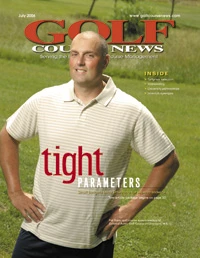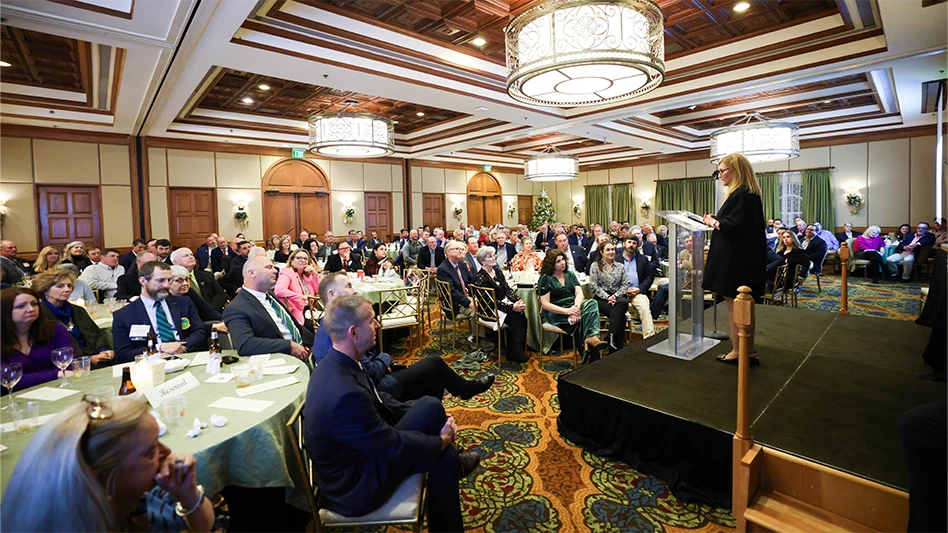With LESCO’s National Accounts program, one-stop shopping saves golf course management companies time and money. That consolidation of purchasing is an element management companies seek to run their businesses better, and LESCO has the products to fill 80 to 90 percent of their needs, according to Dave Wolfard, director of national accounts for golf.
“Our private LESCO label has grown tremendously,” he says. “We’re constantly introducing innovative new products and new formulations. We have multiple categories including fertilizer, quality seed and control products. We can bring the best to the market in a larger sense in dollars and distribution.”
The broad range of products is an advantage for development companies building new golf courses. The company works with architects and builders to provide services and products from construction through the grow-in, as well as for the management program once the course is opened.
In its seventh year of operation, San Diego-based Heritage Golf Group has partnered with LESCO from the beginning. Heritage is a firm believer in consolidating purchases into one basket as it relates to product, according to Norm Goodmanson, vice president of development.
“We consider a national account agreement more than establishing the purchasing pricing,” he says. “We’re basically getting married to the company, doing business with them exclusively within that agreement. It gives us the ability to control and lower our pricing; and secondarily, it frees the golf course superintendents from price shopping and gives them more time to do what they should be doing – managing the golf course.”
LESCO’s national accounts program has grown during the nine years of its existence.
“When I came on board about eight years ago, we were around the $5-million mark,” Wolfard says. “We’ve grown that to more than $30 million. The largest golf course management companies probably handle around 80 percent of the managed courses, and we do business with the majority of them.”
Wolfard works directly with four national account managers: Tom Comalli, Les Guedel, Eddie Fatica and Phil Gardner, who split the U.S. golf market. Additionally, Fatica covers Mexico and the Caribbean, and Gardner serves Canada, Europe, Australia and Asia.
But it’s the combination of the big picture and the local footprint that ties it all together.
“With 311 Service Centers and 114 Stores-on-Wheels vehicles, we have the ability to provide personalized service for the superintendents delivered by individuals with a solid agronomic background and the latest technical training,” says Bob West, the company’s director of communications and industry affairs. “At the same time, we can maximize efficiency for the management companies. Their purchasing manager can work with Wolfard and his team to designate the products approved by their corporate office for purchase by the superintendents.”
However, there’s more than pricing involved in an agreement with LESCO: It’s about relationships and trust.
“While I work primarily with their national account personnel, it’s the local relationships we rely on to serve our golf course superintendents on a regular basis,” says Stan Wreyford, senior vice president of agronomy for Century Golf, which manages 44 golf courses throughout the United States.
Most of the golf courses managed by Century Golf are served directly by the Stores-on-Wheels vehicles backed up by the local Service Centers.
Century met with all its property managers in June, and LESCO put on an educational session that addressed multiple issues on the golf course, focusing on much more than its products.
“I can negotiate price with anyone, but it’s that kind of additional service and support that makes our relationship more of a partnership than a purchasing agreement,” Wreyford says.
LESCO also has the challenge of being flexible enough to meet each company’s needs internally.
“We become an integral part of their own system, working with them to customize a program to provide the reporting and tracking systems they want,” Wolfard says.
Program components can include monthly purchasing reports, tracking by product categories and product, with comparisons to the previous year and to the projected budget.
The LESCO relationship has served Heritage well financially and logistically, according to Goodmanson. The superintendents have the personal service on the local level and can track their own courses’ budgets.
“I get detailed, up-to-date financial information, so I can look at what the volume is as it relates to all of our courses covered by the national accounts,” he says. “They have to be thinking about our business and how we can make our business more successful and be nimble enough to make suggestions and act on them.
“One of the things we do in our budgeting process is ask the superintendents to give us a very detailed checklist of fertilizers and chemicals for their course,” Goodmanson adds. “We zero-base our budget for those areas. We asked LESCO to look at those lists and review their product line to see if there would be any items in their inventory that would be as efficient but more cost effective. They were able to come back to us with a substantial amount of savings. Not making those suggestions would initially have generated more revenue for LESCO. But by doing so, they showed the strength of their commitment to serving our business.”
National Account customers can get whatever they need, from a broad overview to the specific details, so they’re able to manage their businesses more efficiently and profitably, at a higher level of service, according to Wolfard.
“That goes right to their bottom line,” he says.
Another Resource
Service Centers support golf courses, too
There’s a perception in the golf industry that the Stores-on-Wheels program is the only way LESCO sells to golf courses, however, that’s only part of the picture.
“Our Service Centers are in fixed locations with an even wider range of merchandise, and they are staffed by personnel with the same extensive technical training and background to meet our customers’ needs,” says Bob West, LESCO’s director of communications and industry affairs.
The first Service Center opened in Fort Lauderdale, Fla., during the 1980s. By the end of the ‘80s, there were 39. The ‘90s brought even more growth, and there were almost 200 by the end of the decade. LESCO has 311 Service Centers in 39 states – 85 of them were opened during the last three years. Another 40 are planned for 2006, increasing the level of service to current customers and extending services to new customers.
The basic concept of the Service Centers is one-stop shopping. Superintendents can call, e-mail or fax in an order directly to their local Service Center to be picked up at a specified time. They can take advantage of the new LESCODirect feature at www.lesco.com and have the order delivered to their local Service Center for pick up. They also can stop into the Service Center and personally shop for products. Many superintendents use a combination of these methods.
Personal service is another important factor, according to Stan Wreyford, senior vice president of agronomy for Century Golf. He says the Service Centers are a great resource, especially for unplanned needs.
“One of our superintendents told me a scheduling change meant they could put some spray down before the golfers hit the course on Saturday morning, but they needed more material to finish the job,” he says. “He went into the local Service Center, figuring he’d get the material as soon as they opened and try to get back in time for his crew to wrap up the procedure. The manager was already inside working when he pulled up. He unlocked the center and got him what he needed so he was back on the road and at the course in plenty of time to get the job done.”
That kind of service, the broad assortment of products and the addition of new Service Center are vital building blocks for growing the company’s overall golf course sales.

Explore the July 2006 Issue
Check out more from this issue and find your next story to read.
Latest from Golf Course Industry
- Advanced Turf Solutions and The Aquatrols Company release soil surfactant
- Heritage Golf Group acquires North Carolina courses
- Editor’s notebook: Green Start Academy 2024
- USGA focuses on inclusion, sustainability in 2024
- Greens with Envy 65: Carolina on our mind
- Five Iron Golf expands into Minnesota
- Global sports group 54 invests in Turfgrass
- Hawaii's Mauna Kea Golf Course announces reopening





